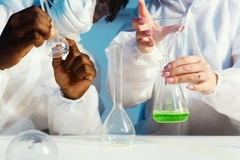Dow to use plastic waste-derived pyrolysis oil from Freepoint Eco-Systems for packaging

27 May 2024 --- Dow and Freepoint Eco-Systems have entered a supply agreement for 65,000 metric tons of certified-circular, plastic waste-derived pyrolysis oil to produce virgin-grade equivalent plastics in Dow’s US Gulf Coast operations. The companies are building a recycling system that converts plastic waste into new materials, fostering a circular economy for plastics in North America.
Freepoint Eco-Systems’ advanced recycling facility, to be built in Arizona, will be ISCC Plus-Certified and recycle end-of-life plastic waste from the region, otherwise destined for landfills or incineration, by converting that waste into recycled pyrolysis oil.
Dow will transform the certified circular liquid supply into virgin-grade equivalent plastics and develop new products through a mass balance approach to meet customer demand for recycled content.

“Our agreement with Freepoint Eco-Systems marks another important step in Dow’s pursuit to source circular supply and transform end-of-life plastic waste into products that help our customers meet their recycled content goals,” says Victor Zapata, North America commercial VP of Dow Packaging and Specialty Plastics.
The companies explain they share the goal of supporting a circular economy for plastics in North America.
Dow adopts waste
For every metric ton of plastic waste, approximately 70% is expected to be converted to pyrolysis oil and sold exclusively to Dow for phase one of the facility, planned to begin in 2026.
 Dow and Freepoint Eco-Systems turn plastic waste into new packaging.“This agreement with Dow represents a substantial step toward accelerating the circular economy in the region and helps to scale what will be an important advanced recycling facility in the US. We are expanding capabilities for more circular economy solutions for plastic waste globally,” asserts Jeff McMahon, managing director at Freepoint Eco-Systems.
Dow and Freepoint Eco-Systems turn plastic waste into new packaging.“This agreement with Dow represents a substantial step toward accelerating the circular economy in the region and helps to scale what will be an important advanced recycling facility in the US. We are expanding capabilities for more circular economy solutions for plastic waste globally,” asserts Jeff McMahon, managing director at Freepoint Eco-Systems.
Once fully operational, the facility can recycle approximately 180,000 metric tons of plastic waste per year — equivalent to the weight of around 9,000 fully loaded semi-trailer trucks. The resulting circular products will suit various packaging applications and reduce reliance on fossil feedstocks.
Phase one will initially process 90,000 metric tons of waste, yielding 65,000 metric tons of pyrolysis oil sold exclusively to Dow.
“Through this collaboration, Dow is redefining how we source raw materials for our products while tackling the challenge of plastic pollution. By converting locally available plastic waste that was destined for landfills or incineration into pyrolysis oil supply for our US Gulf Coast operations, we are building a reliable circular feedstock supply portfolio,” adds Jeff McMahon, managing director at Freepoint Eco-Systems.
Clean packaging
Last week, Pact Collective and Eastman qualified to use clean, multi-color PET waste from Pact members and consumers as feedstock for Eastman’s methanolysis technology. Eastman’s technology addresses the mechanical recycling challenges of multi-colored PET at material recovery facilities.
Lush will roll out Prevented Ocean Plastic, made by Spectra Packaging, globally in North America and Japan later this year. The company said customers are “helping to protect marine ecosystems and the coastal communities who are at the forefront of the effects of ocean plastic pollution” when they purchase a product in a clear plastic bottle marked with the Prevented Ocean Plastic logo.
Edited by Sabine Waldeck













